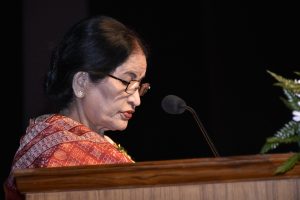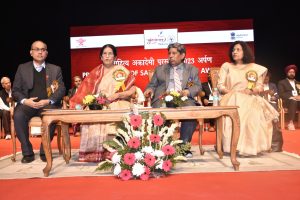Religion , politics divides, but literature never divides- Says eminent Oria writer Pratibha Ray
 NEW DELHI : “without the progress of language, no culture can survive for long”. “Literature connects everyone. Literature never divides. Therefore, writing is always universal and does not lose its lustre even in times of various changes Jnanpith winner Odia writer Pratibha Ray said while addressing Sahitya Akademi Awards 2023 presentation ceremony in Delhi.
NEW DELHI : “without the progress of language, no culture can survive for long”. “Literature connects everyone. Literature never divides. Therefore, writing is always universal and does not lose its lustre even in times of various changes Jnanpith winner Odia writer Pratibha Ray said while addressing Sahitya Akademi Awards 2023 presentation ceremony in Delhi.
She said “I always tell (people) that religion divides, politics divides, but literature never divides. Literature creates a bond of emotional national integration. If you want to have emotional national integration, it can happen only through literature.”
Speaking at the award ceremony, said that “without the progress of language, no culture can survive for long”. “Literature connects everyone. Literature never divides. Therefore, writing is always universal and does not lose its luster even in times of various changes. All Indian languages give us strength and also prepare us to speak the language of love,” she said.
Twenty four writers, including English author Neelum Saran Gaur and Hindi novelist Sanjeev, received the Sahitya Akademi Award for 2023 here on Tuesday. The award ceremony coincided with the 70th anniversary celebrations of the National Academy of Letters at the ‘Sahityotsav’.The awards were given for literary works including nine books of poetry, six novels, five of short stories, three essays and one literary study.
The event was also attended by Sahitya Akademi president Madhav Kaushik, vice president Kumud Sharma and secretary K Sreenivasarao.
Sanjeev for his novel “Mujhe Pehchaano” and Gaur for her book “Requiem in Raga Janki” received the prestigious award. Sadiqua Nawab Saher received the award for her book “Rajdev Ki Amrai” in Urdu, while Swarnjit Savi was awarded for his book of poetry “Mann Di Chip” in Punjabi.
Other recipients of the awards in poetry include Vijay Verma (Dogri), Vinod Joshi (Gujarati), Manshoor Banihali (Kashmiri), Sorokkhaibam Gambhini (Manipuri), Ashutosh Parida (Odia), Gaje Singh Rajpurohit (Rajasthani), Arun Ranjan Mishra (Sanskrit) and Vinod Asudani (Sindhi). Apart from Gaur, Sanjeev and Saher, writers such as Swapnamay Chakrabarti (Bengali), Krushnat Khot (Marathi), and Rajasekaran Devibharathi (Tamil) have been awarded for their novels.
For short stories, Pranavjyoti Deka (Assamese), Nandeswar Daiman (Bodo), Prakash S Parienkar (Konkani), Taraceen Baskey (Turia Chand Baskey) (Santali) and T Patanjali Sastry (Telugu) got the award. Lakshmisha Tolpadi (Kannada), Basukinath Jha (Maithili) and Judhabir Rana (Nepali) received the prize for their essays, while EV Ramakrishnan was awarded for his literary study in Malayalam.
Kaushik lauded writers and litterateurs for “preserving humanity” through their works.“It is true that it has never been convenient to create literature at any point of time in history. A litterateur has always walked on hot coals so that they can be the spokesperson of the common man.“They can hear the voice of the voiceless, they are the eyes of those who cannot see. They feel the pain of one who steps on a thorn,” Kaushik said.
The awards are selected on the basis of unanimous selections made by the jurors or the selection made on the basis of a majority vote. The awards relate to books first published during the five years immediately preceding the year of the award, i.e. between 1 January 2017 and 31 December 2021.The authors and poets received the award in the form of a casket containing an engraved copper plaque, a shawl and an amount of Rs 1 lakh.

